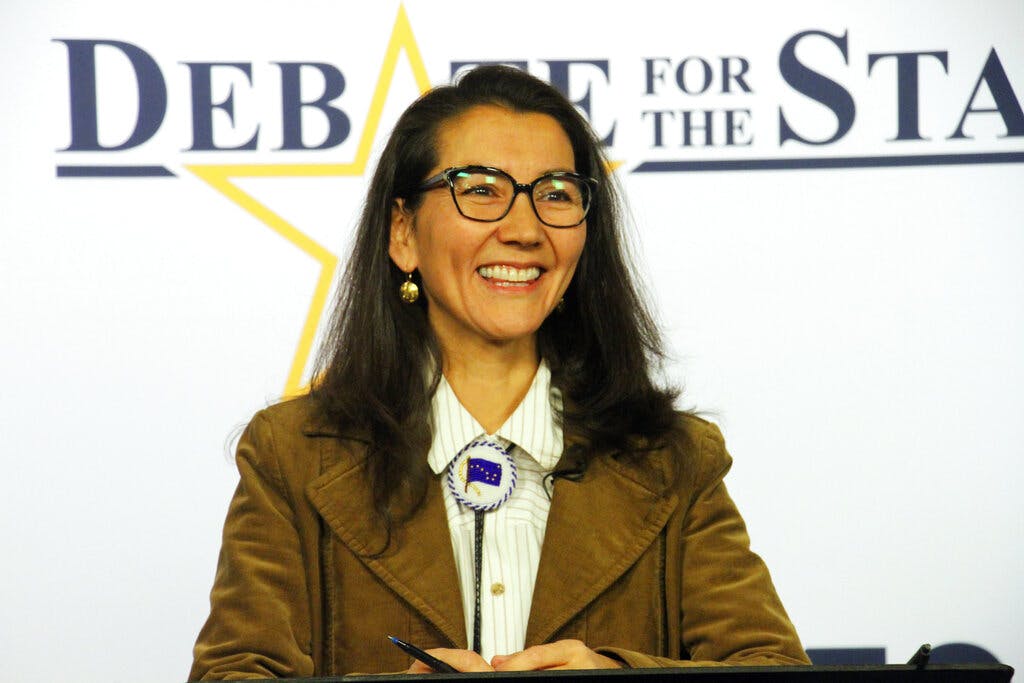‘Rocketship Ride of Popularity’ Set To Propel Peltola to Victory in Alaska
A Democrat’s popularity is being compared to Sarah Palin’s when she first came to the public’s attention. The former governor even praised her as ‘a real Alaskan chick.’

The same pollster who suggested that Representative Mary Peltola would win Alaska’s special election over the summer is predicting that Ms. Peltola, a Democrat, is a heavy favorite for the November election.
“The public has decided that they like Mary Peltola in spite of the fact that she’s a Democrat,” the Alaska Survey Research pollster, Ivan Moore, is telling the Sun. “That’s really all there is to it.”
The four-way race is using Alaska’s new ranked choice voting system, which allows voters to choose candidates in an initial round and then, absent a majority winner, redistributes in instant runoffs the votes of the losing candidates to the voter’s second, third, or fourth choice.
Alaska Survey Research’s latest survey shows Ms. Peltola polling at 48.9 percent in first-round votes, the highest of any candidate and just more than a point below the majority required to win outright.
Her three competitors are the former Republican governor, Sarah Palin, a state Republican leader, Nick Begich, and a veteran and libertarian, Chris Bye. They are polling at 25.6 percent, 20.5 percent, and 5.0 percent respectively.
In the second round of voting, the poll foresees Mr. Bye being eliminated and Ms. Peltola pushing across the crucial 50 percent threshold. Mr. Begich would likely be eliminated in the third round.
In the final tally Ms. Peltola is seen with 56.1 percent of the vote to Ms. Palin’s 43.9 percent, a margin of victory well outside the poll’s 3 percent margin of error.
These survey results suggest that Ms. Peltola’s shocking August victory was not a fluke and could be repeated in a higher-turnout election like this November.
“It’s looking very good for her and surveys are never meant to be predicted but it’s a big change that needs to happen in the last two weeks — change doesn’t usually happen that fast,” Mr. Moore said.
While the ranked choice voting system does provide voters with more choices, doesn’t force voters to vote strategically, and ensures that the winner of an election must receive a majority of the vote, not everyone is happy with the system.
Mr. Moore reports that those who self-identify as conservatives dislike the system by an eight-to-one margin, though everyone else, from moderates to progressives, supports it by a three-to-one margin.
Some conservatives, like Senator Cotton of Arkansas, have gone to Twitter to claim that the system “disenfranchises voters.” Mr. Cotton claims that “60 percent of Alaska voters voted for a Republican, but thanks to a convoluted process and ballot exhaustion — which disenfranchises voters — a Democrat ‘won.’”
While Politifact’s Amy Sherman has judged Mr. Cotton’s claim as “mostly false,” writing that Mr. Cotton’s “comments misinterpret how ranked choice voting works,” he is not the only critic of the system.
Both Ms. Palin and Mr. Begich called for the other to drop out of the November race following the August result, claiming that they split the vote. However, it’s not clear that this would have changed the final result.
Others have taken to editorial pages to argue that the election system is “rigged” by liberals inside and outside the state, and that the system and ballots are too complicated to understand.
Mr. Moore, among others, calls such claims “absurd” and says that Ms. Peltola’s victory has less to do with the voting system or the Republican candidates and more to do with Ms. Peltola’s “very rare rocketship ride of popularity.”
Even Ms. Palin is a fan, congratulating her after her win and, according to Ms. Peltola, texting her to say that she’s “a real Alaskan chick.”
“Let’s not miss the main factor here, which is that Mary Peltola has caught people’s attention in a positive way — in a way that’s very reminiscent of when Sarah Palin first came to the public’s attention,” he said.
There is also evidence to suggest that Alaskans overwhelmingly understand their new voting system and little to suggest that they don’t. However, people can decide for themselves whether they can figure out an Alaskan primary and general election ballot.
A poll conducted by the Patinkin Research Strategies found that 57 percent of voters report that voting in the new system was “very simple” and 28 percent say it was “somewhat simple.”
For comparison, only 6 percent thought that the system was “very difficult” and 9 percent reported feeling voting was “somewhat difficult.”
The policy director of a group that advocates for adoption of ranked choice voting, the Ranked Choice Voting Resource Center, Chis Hughes, told Alaska Public Radio: “Clearly, people understood how to mark the ballot effectively.”
Aside from the fact that some Republicans — including Ms. Palin — repeatedly encouraged voters to vote for only one candidate, Republicans who are looking for why they lost might find answers in the latest opinion polling from Alaska Survey Research.
According to their latest survey, 51.6 percent of voters have a positive opinion of Ms. Peltola; 26.6 percent of voters have a negative opinion of her.
Public opinion of both Ms. Palin and Mr. Begich is upside down. Only 32.8 percent of voters have a positive opinion of Ms. Palin, compared to 60.8 percent who hold a negative opinion. For Mr. Begich, those numbers are 32.4 percent and 38.3 percent respectively.

